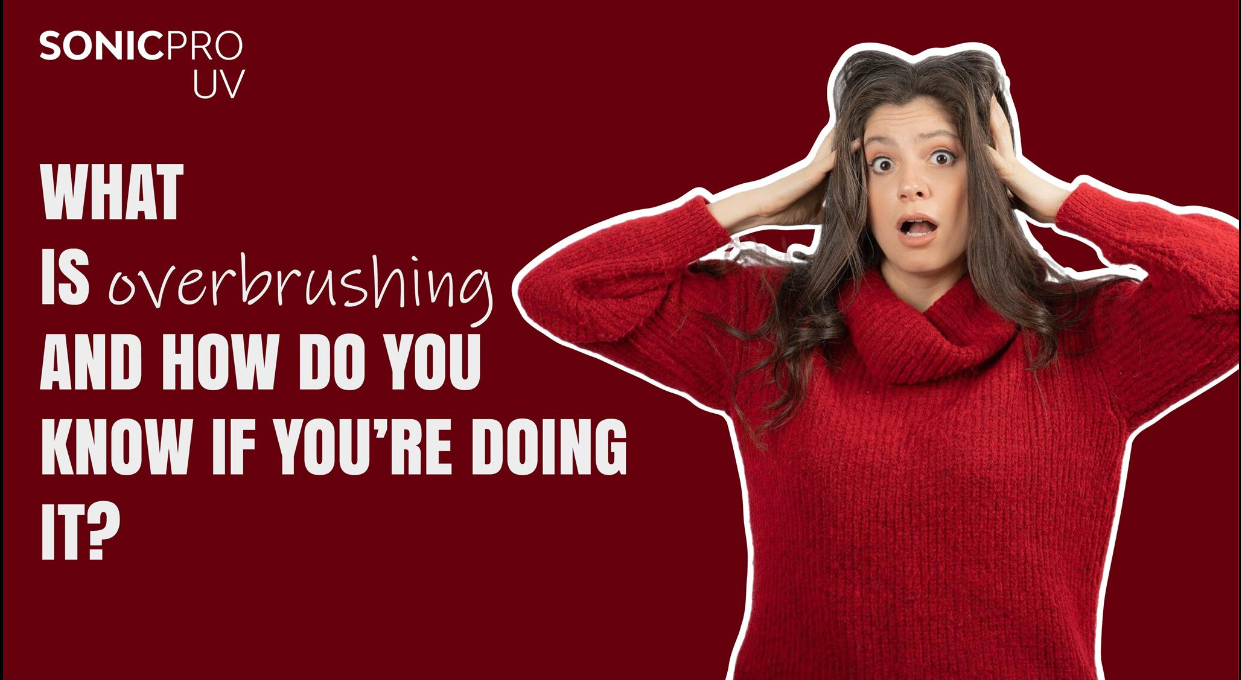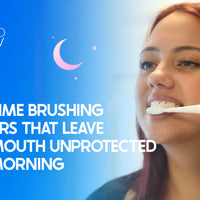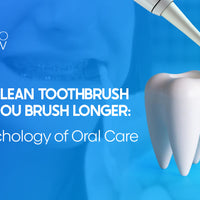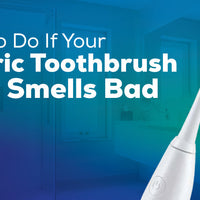Summary:
- Overbrushing happens when you brush too hard, too often, or with the wrong technique.
- Signs of overbrushing include tooth sensitivity, bleeding gums, gum recession, and enamel wear.
- Aggressive brushing can lead to long-term issues like enamel erosion, cavities, and gum disease.
- Dentists recommend brushing gently for two minutes, twice daily, with a soft-bristle toothbrush.
- The SonicPro UV Electric Toothbrush helps prevent overbrushing with pressure sensors and smart timers.
It is possible to have too much of a good thing, and brushing your teeth is the perfect example. Overbrushing happens when brushing becomes aggressive, frequent, or poorly executed, and it can gradually wear away at your teeth and gums. Too little brushing leaves plaque and bacteria behind, while too much can damage enamel and irritate gums.
What Is Overbrushing?

Overbrushing refers to brushing with too much force, brushing too often, or using improper technique. It is not only about frequency but also about the way the toothbrush is used.
Common causes of overbrushing include:
- Brushing more than three times per day.
- Brushing longer than the recommended two minutes.
- Using hard-bristle toothbrushes that scrape enamel.
-
Applying excessive pressure when brushing.
When these habits combine, they create unnecessary strain on teeth and gums. Over time, this can undo the very benefits you are aiming for when brushing.
Signs You Might Be Overbrushing
Spotting the signs of overbrushing early is important because it allows you to adjust your habits before lasting damage occurs. Here are the most common red flags:
Gum Sensitivity

An obvious indicator of excessive brushing is heightened sensitivity to the gums. You may be brushing too hard or too frequently if your gums bleed or pain when you brush. When brushing, healthy gums should be comfortable. Try using a softer toothbrush and changing your technique if you feel any pain or bleeding. It's critical to follow your body's cues and see your dentist if the sensitivity doesn't go away.
Receding Gums
Gum recession is another indicator that you may be overbrushing. An excessive amount of force during brushing may cause your gums to separate from your teeth, exposing more of the tooth's surface. Cavities may become more likely as a result, and teeth discomfort may result. It's important to reevaluate your brushing routines if you observe that your gums seem to be receding or that your teeth appear longer than previously. Seeing a dentist can provide you advice on how to make your oral hygiene regimen better.
Tooth Sensitivity

Overbrushing could be the cause if you notice that your teeth are sensitive to hot or cold foods and beverages. Over Brushing can cause enamel deterioration and sensitivity. The dentin beneath the enamel becomes increasingly vulnerable to temperature variations when the enamel's protective coating thins. If you feel pain when eating or drinking, think about using toothpaste made especially for sensitive teeth and talk to your dentist about how to brush your teeth properly.
Worn Toothbrush Bristles
Examining your toothbrush on a regular basis might also reveal information about how you brush. It could indicate that you are brushing too vigorously if you see that your toothbrush's bristles are ragged or wearing out soon. Bristles need to hold their form for a few months of regular use. If after just a few weeks your toothbrush starts to show wear, think about switching to a softer brush and practicing more gentle brushing techniques.

Increased Cavities
It's interesting to note that, despite efforts to keep the mouth clean, excessive brushing can raise the risk of cavities. The teeth's roots may become exposed as a result of vigorous cleaning, which increases their vulnerability to decay. It may be time to review your brushing regimen if you notice that you are getting more cavities than you used to. Speak with your dentist about any changes in your oral health and decide on the best course of action to avoid problems in the future.
Discomfort When Chewing
Overbrushing may be the cause of any pain or discomfort you feel when chewing. The wear and tear on your gums and teeth from rigorous brushing can lead to sensitivity and discomfort during normal activities. It's critical to change your brushing habits if you find yourself avoiding particular foods because of pain. In addition to easing discomfort, a moderate approach can support healthier gums and teeth.

Irritated or Swollen Gums
Irritated or swollen gums can signal overbrushing. Healthy gums should be pink and firm, not red, swollen, or painful. If you notice changes in your gum appearance or experience discomfort, it may be time to evaluate your brushing technique. Adjusting your pressure and frequency can help reduce inflammation and promote gum health. Regular check-ups with your dentist can also provide valuable insights into maintaining healthy gums.
Difficulty Maintaining a Brushing Routine
You can be overbrushing if you notice that your anxiety about maintaining good dental hygiene causes you to brush more than the advised twice a day. Although it's crucial to practice good dental hygiene, brushing too much can backfire. If you find yourself needing to brush more often, think about scheduling a balanced routine with your dentist that will protect your teeth without causing harm.
Damage to Tooth Enamel
Enamel loss brought on by overbrushing can raise the risk of cavities and sensitivity. Indicators that your enamel is being worn down by vigorous brushing include teeth that seem more translucent or that clearly show grooves. Preventing additional damage to your enamel can be achieved by adopting protective measures, like switching to a softer toothbrush and brushing with light pressure.

Difficulty Achieving Fresh Breath
Overbrushing may be harming your dental health if you find that your foul breath persists even after brushing frequently. The delicate balance of germs in your mouth might be upset by vigorous brushing, which could result in problems. Keeping your breath fresh requires that you brush efficiently without going overboard. To improve oral hygiene, think about using mouthwash and flossing in addition to your usual brushing schedule.
Consequences of Overbrushing
Ignoring the signs of overbrushing can have lasting consequences for oral health.
-
Enamel erosion: Once enamel is worn away, it does not grow back. Enamel loss increases sensitivity and makes teeth more susceptible to cavities.
-
Gum recession: Receding gums expose the roots, which are not protected by enamel. This raises the risk of periodontal disease and tooth loss if left untreated.
-
Restorative treatments: In severe cases, dental bonding, gum grafts, or crowns may be required to restore damaged teeth and gums. These treatments are more costly and invasive compared to simply adjusting brushing habits.
How SonicPro UV Helps Prevent Overbrushing
Technology can make it easier to avoid common mistakes. SonicPro UV is designed with features that directly address the issue of overbrushing.
- Built-in pressure sensors and timers: These sensors let you know when you are brushing too hard, and the timer ensures you brush for the right duration.
- Soft, durable brush heads: The brush heads are made for gentle cleaning that still delivers powerful plaque removal without harming enamel or gums.
- UV sanitizing chamber: Beyond overbrushing prevention, SonicPro UV also keeps your toothbrush clean by killing 99.9 percent of germs between uses.
With these features, SonicPro UV helps users strike the perfect balance between effective cleaning and oral protection.
Conclusion
Overbrushing is a surprisingly common oral health issue, but the damage it causes is completely avoidable. By brushing gently, using soft bristles, and following proper techniques, you can protect your enamel and gums while keeping your teeth clean.
Read More Articles:
- 10 Benefits of Using an Electric Ultraviolet Toothbrush
- 5 Reasons Why SonicPro UV is the #1 Electric Toothbrush for Kids
- 5 Surprising Health Benefits of the SonicPro UV Toothbrush
- Manual vs. electric toothbrush: which is better?
- How to Save Money at the Dentist with an Ultraviolet Toothbrush?
- Top Tips for Cleaning Your Electric Toothbrush for Cavity Prevention







